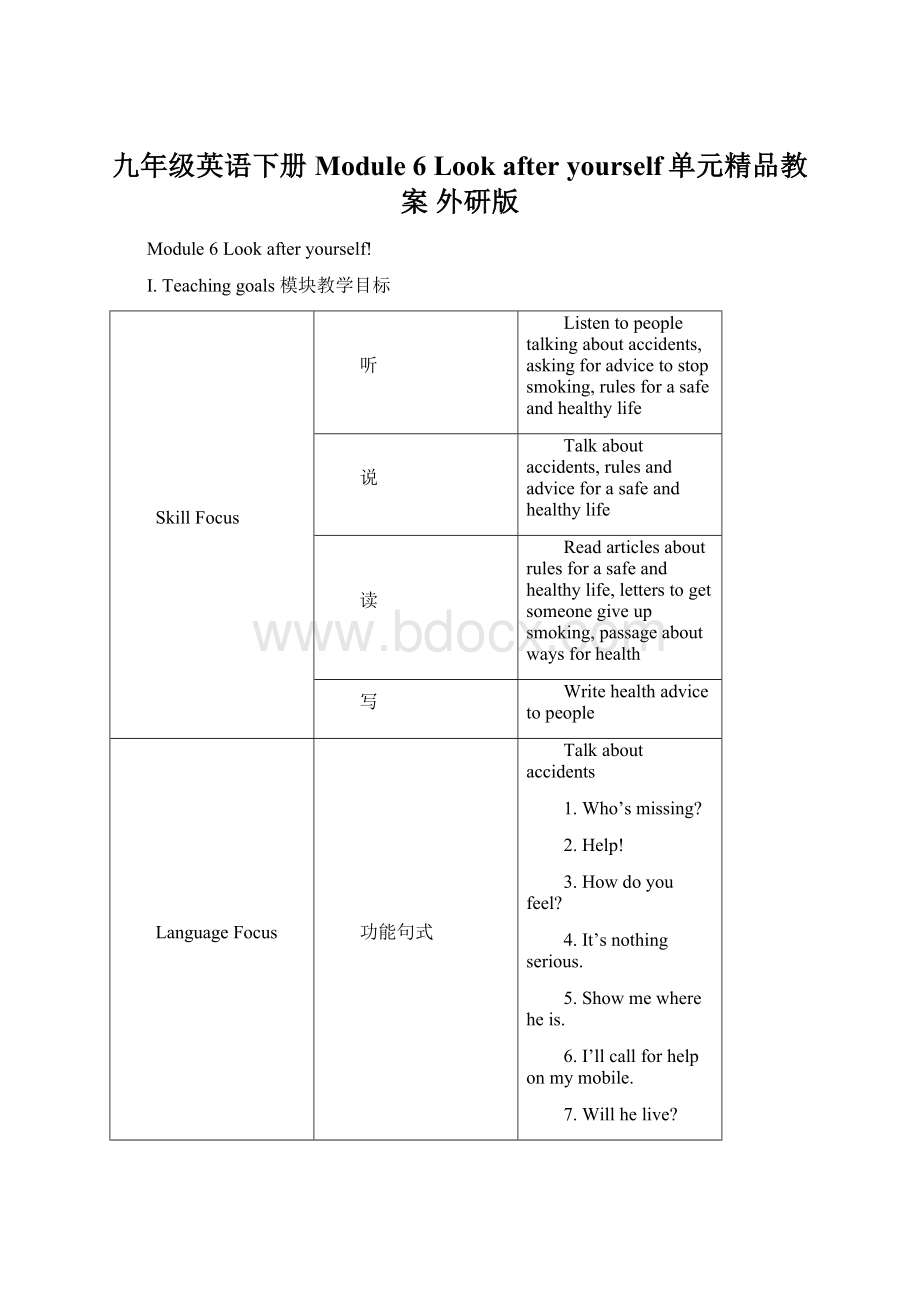九年级英语下册 Module 6 Look after yourself单元精品教案 外研版Word格式.docx
《九年级英语下册 Module 6 Look after yourself单元精品教案 外研版Word格式.docx》由会员分享,可在线阅读,更多相关《九年级英语下册 Module 6 Look after yourself单元精品教案 外研版Word格式.docx(33页珍藏版)》请在冰豆网上搜索。

8.Canyoumoveyour…?
9.He’llsoonbeOK!
10.Waitaminute.
Givingadvice
1.Becareful!
It’sdangerousoutthere!
2.Don’tbeacouchpotato!
3.Watchyourdiet!
4.Restupwhileyoucan!
5.Don’tworry.Behappy!
6.Sayno…tosmokinganddrugs!
词汇
1.重点词汇
flukneewoundmisstripimprovementoncomingcouchexpertfitamountweighteffectshockhitgladbreathecancerfix
2.认读词汇
fevercooker
语法
Tenses:
1.一般现在时do/does/be
2.一般过去时did
3.一般将来时will/begoingtodo
4.现在完成时has/havedone
5.过去进行时was/weredoing
重点句子
1.He’sgotawoundinhislegandhemaygetafeverbutit’snothingserious.P48
2.Say…notosmokinganddrugs.P51
3.Thinkabouttheeffectonyourfamilyandfriends…P51
5.WhenMumasksyoutosmokeoutsideyouthinkshe’sjustbeingdifficult.P54
II.Teachingmaterialanalyzing教材分析
本模块以Lookafteryourself为话题,以学习谈论健康生活的规则为主线,介绍了很多安全和健康生活规则。
通过模块学习,学生将重点复习已学基本时态的用法、词汇和功能句;
了解安全健康生活规则,并能运用正确的时态和所学单词或功能句去给他人提出关于健康生活的建议。
Unit1通过听、读、说训练,初步学习谈论事故的问题。
其中Activity1相当于整个单元的Warmingup部分。
由于该教材是小学起点,即学生在小学阶段已经接触过相关话题,因此这个活动激活学生已有的目标语言;
Activity2是一听能训练,要求学生听后捕捉细节;
这部分的语言描述与Activity1有很大关系;
因此在Activity1中尽量体现与本模块话题相关的语言表达是很重要的;
Activities3-6是一个整体。
可以可看作是对学生的语言输入。
Activity4是要求学生在听和读的基础上把握accident所应包含的要素,从而帮助他们阅读同类体裁的文章;
Activity5要求学生阅读课文并找出相关细节问题的答案;
Activity6要求学生在理解课文、一定训练的基础上对课文内容进行概括、复述,综合性要求较高。
教师可以在此之前帮助学生归纳总结询问、描述伤势等目标语言,以便学生能够准确地使用这些语言;
Activities7&
8是新课程标准语音项目表中所要求的,同时也为Activity9的“说”部分做了准备;
Activity9是一个语言输出部分,要求学生运用目标语言来描述自己的经历。
Unit2通过读、写训练,学习谈论健康生活的规则。
该单元共设计了8个活动。
其中Activity1相当于整个单元的Warmingup部分,设计该活动的目的在于激活学生与该主题有关的目标语言和经历;
同时也是在训练学生有关该话题的表达能力。
根据题目要求学生应从三方面来完成:
advantage/danger/describe。
Activities2—5要求学生阅读介绍“安全和健康生活规则”的短文,完成各种练习。
这些活动主要是训练学生的阅读能力,并让学生了解更多的健康生活规则,为以后的口语和书面语输出做准备。
Activities6-8写作即书面语输出阶段,要求学生根据以上活动的学习内容写作,该部分应包括以下几个方面:
1、从课文中提取rules并对每个rule举例说明应该做什么和不应该做什么;
这里用一般现在时态;
2、列举破坏rule的经历,用一般过去时描述所发生的事情;
3、用一般将来时态表明应该怎样做才能安全以及健康。
Unit3对“安全和健康生活规则”进行综合训练,并在此基础上学习时态。
其中Activities1-2要求练习时态。
因此可以把这两个活动作为一个课时来上,以帮助学生掌握时态。
Activities3-8要求学生用正确的时态做各种关于“健康生活的规则”的练习。
Aroundtheworld介绍了笑对健康的作用。
Moduletask要求学生为他人提供健康建议。
因此可以把这些部分放在一起组合成一节综合技能课。
III.Classtypesandperiods课型设计与课时分配
Period1Listeningandspeaking(Unit1)
Period2Readingandwriting(Unit2)
Period3Grammar(Activities1-2Unit3)
Period4Integratingskills(Activities3-8,Aroundtheworld,ModuletaskUnit3)
IV.Teachingplansforeachperiod分课时教案
Period1Listeningandspeaking
Languagegoals语言目标
1.Targetlanguage目标语言
a.Words词汇
feverflukneewoundmisstrip
b.Keystructures重点句式
Who’smissing?
Help!
Howdoyoufeel?
It’snothingserious.
Showmewhereheis.
I’llcallforhelponmymobile.
Willhelive?
Canyoumoveyour…?
He’llsoonbeOK!
Waitaminute.
2.Abilitygoals能力目标
Enablestudentstolistentoandtalkaboutaccidents.
3.Learningabilitygoals学能目标
Helpthestudentslearnhowtotalkaboutaccidents.
Teachingimportantpoints教学重点
Teachthestudentstolearnnewwordsandphrasesandhowtotalkaboutaccidents.
Teachingdifficultpoints教学难点
Teachthestudentshowtotalkaboutaccidents.
Teachingmethods教学方法
Reading,talking,listeningandspeaking.
Teachingaids教具准备
Twotaperecorders,wordcardsandaprojector.
Teachingproceduresandways教学过程与方式
StepIVocabulary
Trytomakestudentsrememberthenewwordsandexpressions.
Askstudentstoreadthenewwordsaftertheteacher.Aftermakingsurethatallthestudentscanreadthemcorrectly,givethem5ormoreminutestolearnthewordsbyheart.Thenaskthestudentstodictateinpairs.
Theteachercanplaycardgameswithstudentstohelpthemrememberthenewwords.TheteachercanpreparesomecardswithEnglishwordsononesideandtheirChinesemeaningsontheotherside.ThenrandomlypicksoutonecardforstudentstosaytheEnglishwordsortheirChinesemeaning.
StepIITalking
AskstudentstolookatthepictureonPage48,andtalkaboutquestionsinActivity1inpairs.Encouragethestudentstotrytousethenewvocabulary.Beforethestudentstalkingaboutthispicture,theteachercanintroducesomeusefulexpressionsforthestudentstoreferto.
1.see+sb.+doing
2.firstaid:
急救
givefirstaidtosb/givesbfirstaid:
对人进行急救
3.knockdown:
撞倒
4.haveafever:
发烧
5.haveaflu:
得了流感
6.havenothingtodowith:
与……无关
7.awoundinoneknee:
某人
8.bindup:
包扎
T:
Whatcanyouseeinthepicture?
S:
Icanseesomepeople.
Icanseeatree.
Icanseeadoctor.
Icanseeaboylyingonthegroundandthedoctorisgivingfirstaidtohim.
Yes,verygood.What’shappenedtotheboy?
Doyouthinkhehashadfluorafever?
(Speakslowlyandstresshavefluandafever.Ifnecessary,repeatthesentenceagain.)
Maybe.
Idon’tthinkso.
Why?
BecauseIseethedoctorisbindingupthewound.Theboygotawoundinhisknee.Idon’tthinkthewoundhasanythingtodowithflu.
Whatdoyouthinkhehasdonetohimself?
Maybehehurthimselfwhileplayingbasketball.
Maybehewasknockeddownbyacar.
Maybehefelldownfromthetreewhenhewastryingtopickanapplefromthetree.
Verygood.Doyouthinkthepersonishurt?
Ofcourse,look,hismouthiswidelyopen;
hemustbepainful.
Good.Whatshouldyoudobymeetingsuchsituation?
Call120assoonaspossible.
Takethepersonwhoishurttothehospital.
No,youshouldn’tmovethepersonifheishurt.Youshouldwaitforthedoctor.
Youcanaskthepersonwhoishurtwhetherhecanmovebyhimself.
Good.Iwillgiveyouapieceofarticle(seeTeachingResources)foryoutoreadafterclassandyouwillknowwhatyoushoulddowhenyouhavetogivefirstaid.
Step
Listening
GetstudenttodoActivity2.
Mostofusknowhowtodealwithaccidents.Whenitisveryurgent,weshouldkeep…
Calm.
Yes.Andalso,it’snevertoocarefultokeepourselvessafeandsound,becauseit’sreallybadtohaveanaccident.Next,we’lllistentoadialogueaboutaseriousaccident.Fist,lookthroughthequestionsinActivity2andguesswhathashappened.
Severalminuteslater,asksomeofstudentstogivetheiranswers.
Well,timeisup.Who’dliketosaysomethingabouttheanswer?
Tony’sdadeverhadseriousaccidents.
Good.Next,listentothetapeandwritedownkeywords.
Playtherecordertwiceforthestudents.Thenaskthemtoanswerthequestions.
Reading
GetstudentstoreadandlistentothedialogueinActivity3andcompleteActivities4,5,6.Helpthestudentslearnhowtotalkaboutaccidents.
Tony’sdadhadsuchaseriousaccident.Wehavetolearnlessonsformhim.Takecareofyourselfeverywhereandeverytime.Now,tellmewhereitisveryeasytohaveaccident?
Onthecamp.
Whentraveling.
Outing.
That’sit!
DamingandhisfriendsaretravelingontheGreatWall.Butsomethingwronghashappened.Lookthroughthedialogueandtellmewhatthematteris.
Severalminuteslater:
Whathashappened?
Damingishurt.
Yes.
Getthestudentstolistentothedialogue.ThenfinishtheaccidentreportinActivity4.
Sampleanswers:
Accidentreport
Where
alongthewall
Who
Daming
WhatHappened
Damingfelloverthewall.Hecuthiskneeandtherewasbloodonhisleg.Hecouldn’tmoveandwalk.
Howisthepersonhurt?
Notserious
Summarizing
Getstudentstoreadthedialogueagainandhelpthemsummarizewaysoftalkingaboutaccident.
Whensomeonehasanaccident,whatcanwesay?
Help!
Howdoyoufeel?
Whendidthathappen?
Canyoumoveyourfoot?
...
Good.Let’shaveasummary.Whensomeonehasanaccident,wecanusethesesentences.
Showthesentencesontheprojector.
Waitaminute.…(Theusefulsentencesgivebystudentscanbeaddedinto.)
Activity5Askthestudentstoreadthedialogueagainandanswerthequestions.
1.Becauseitiscloudyandgoingtorain.
2.HeleftDaminglyingontheground.
3.About10minutesago.
4.Tocheckwhetherhecanwalkornot.
Activity6Askthestudentstocompletethesentences.
1.Mr.JacksonandBettyhavetowaitforTonyandDamingbecausetheywalkedmoreslowlyandhaveleftfarbehind.
2.AssoonasMr.Jacksondecidedtolookforthem,Bettyheardsomeonecallinghelp.
3.ThereasonwhyDaminghadanaccidentisthathewasrunningalongthewallwhenhetrippedandfellovertheedge.
4.AlthoughDamingcan’twalk,hewilllive.
5.Daminghasgotawoundinhisleg.However,Mr.JacksonsaidhewouldsoonbeOK!
Pronunciation
GetstudentstodoActivities7-8
Wespeaktoshareinformation.Whenwespeak,wewantthelistenertounderstandwhatwesay.Oftenwespeakwithoutvisualaid,intheformofawrittenscript,forinstance.Sensegroupdohelpusinthisaspect.Thecluetounderstanditisthesilence(orpause)thatoccursbeforeandafterit.Divisionofsensegroupsdependsontheidentificationofpa